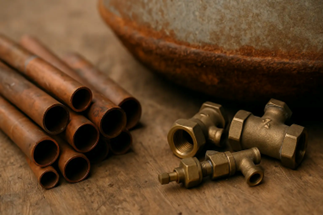Are you a plumber or work on a construction site in New Zealand? Chances are, you may be growing a collection of scrap that needs to be disposed of safely, for the right price. Our guide to scrap metal recycling for plumbers shows you how to make the most of tradies scrap metal while putting real money back in your pocket. Keep reading to find out what pays best, how clean each metal must be, and the simple tricks that turn off-cuts into cash.
Why Should I Scrap Metal?
Construction and demolition waste fills Kiwi landfills every day, yet metal is infinitely recyclable and usually pays out the same week. Separate your scrap, bring it to us, and you will cut disposal costs, boost your sustainability score, and leave with cash in hand.
What We Buy From Plumbers And Builders
Sort each metal into its own drum before you arrive, and we can grade it fast and pay top rates on the spot. If you’re unsure, check out our tradie scrap page.
- Copper: pipe off-cuts, stripped cable, hot-water cylinders
- Brass: taps, valves, fittings from upgrades
- Stainless: commercial kitchen gear, structural fixings
- Aluminium: window frames, scaffold planks, roof flashings
- Lead: old roof flashings, solder residues
- Ferrous & cast iron: beams, mesh, rebar, waste pipes, radiators
How Clean Should My Scrap Metal Be?
We usually purchase tap fittings made of clean brass as long as they contain only a small amount of steel. If your fittings include more steel than normal, we still buy them, but the price per kilo drops a little because they take extra time and effort to process. This rule applies across every grade: the less contamination from plastic, rubber, or solder, the higher the payout.
So, before you come to us, here is what you can do to recycle better as a construction site worker:
- Remove screws or rubber washers from brass tapware.
- Brush off concrete or paint where practical.
- Separate metals into buckets or drums.
How to Gather Scrap Metal for Plumbers: Step-by-Step
Just a few simple changes to your routine can make it easy, profitable, and sustainable to add recycling to your routine. Here’s how to recycle as a plumber on a day-to-day basis, step-by-step:
- Set up bins in your van or workshop: Use labelled buckets or bins for different metals: copper, brass, stainless steel, lead, and mixed metal. Having these on hand makes it easy to toss in off-cuts or old fittings as you go.
- Clean as you go: When replacing hot water cylinders or upgrading taps, remove as much rubber, plastic, or solder as possible on-site. A quick scrape or snip now saves sorting time later and gets you a better payout.
- Keep your copper separate: Bright copper (like stripped cable or pipe with no solder) pays much more than mixed copper. Strip the insulation off the wire and keep your clean off-cuts separate from fittings and painted pipework.
- Save during upgrades and renovations: Plumbing renovations can generate plenty of scrap: valves, taps, and even lead-based solder from older systems. Keep a sturdy container in your trailer for these metals and make it part of your teardown process.
- Drop off regularly or book a pickup: Once your bins are full or you’ve finished a big job, bring your sorted scrap to your nearest Endless Metals branch. If you’ve got bulk material or work in a remote area, ask about regular pickups or trade accounts.
Extra Tips To Get More Money for Scrap
If you’re a tradie or a plumber who wants to squeeze every extra dollar from your scrap? Start with these four proven tactics:
- Segregate by grade: Pure copper can pay five to six times more than mixed scrap.
- Bulk it up: Combine loads with another crew if you are running light.
- Book regular collections: Ongoing trade accounts qualify for reduced pick-up charge?
- Join Tradie Legends! Our exclusive loyalty programme is available to all registered tradies (plumbers, builders, electricians, etc…) and provides better pricing on commodities. Plus, you get put in the draw for monthly and quarterly prizes!
Safety & Compliance
Staying compliant with tradies scrap metal starts by mastering how to recycle for plumbers: secure every load, keep metals separated, and have photo ID ready so we can buy your metal scrap on the spot. Always degas cylinders, cover drums, and wear cut-resistant gloves, eye protection, and a respirator when trimming lead or solder. Follow these quick checks and your scrap will clear the gate fast, earn top rates, and satisfy regulators.
